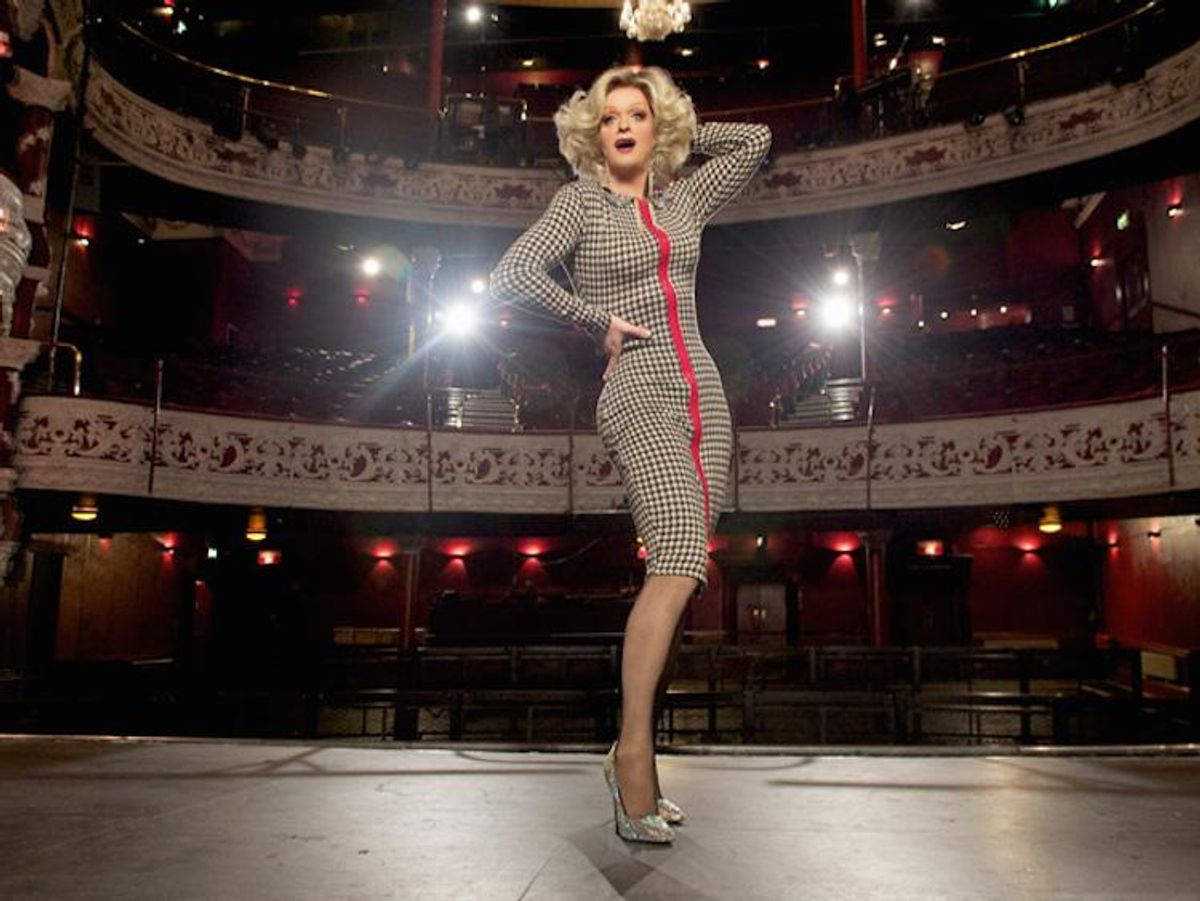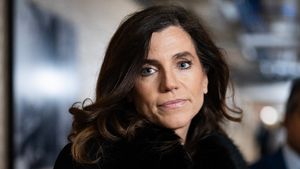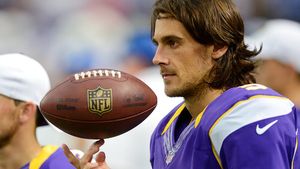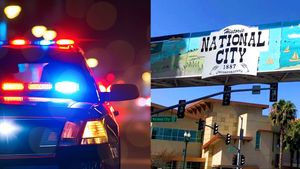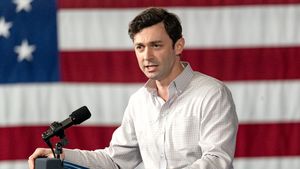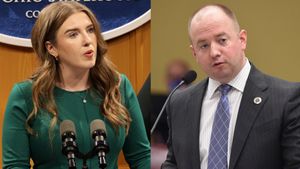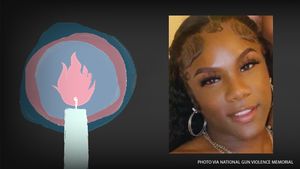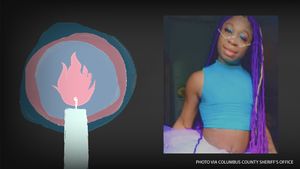Photography by Conor Horgan
Panti, the drag persona of Rory O'Neill, has long been a staple of Dublin's gay community. Proprietress of Panti Bar, a popular gay spot on Capel Street, just across the river from Temple Bar, O'Neill has been visible on the Irish scene entertaining and promoting LGBT rights for decades. This past year, however, Panti's face has been beamed and streamed across the globe as she's taken up the helm of Ireland's fight for marriage equality.
On May 22, Ireland will become the first country in the world to put same-sex marriage to a popular vote (Switzerland legalized registered partnerships in 2007 in a similar fashion, but has yet to decide on marriage). Marriage equality has been sweeping east across Europe, and Ireland could become the last Atlantic-lying country to extend the right. There had been talk of holding a referendum on the issue for a number of years, but discussions took on a much more concrete nature in response to an incident that has come to be known as the Panti Gate Scandal.
In January 2014, O'Neill was asked to name homophobic people in Irish society on The Saturday Night Show. After calling out a number of prominent members of the religious Iona Institute, those named responded by threatening legal action. RTE, Ireland's state-funded broadcasting network (the equivalent of the BBC in the UK), responded by paying out more than $100,000 in settlements. Rightly outraged at the state's failure to protect his freedom of expression, O'Neill gave an impassioned 10-minute speech, the Noble Call Speech, at the Abbey Theatre in Dublin as Panti. The video, in which O'Neill recounts a life deeply affected by Ireland's homophobic society, went viral, with the likes of Madonna, RuPaul, and Stephen Fry praising O'Neill's eloquence.
With just over two months to go, there is reason to be optimistic. Every major political party supports marriage equality, and the Prime Minister, Enda Kenny, has announced that he will join the campaign to see it passed. Some polls have shown upwards of 80% of Irish voters supporting the move, a figure which rises to around 90% in students. Out spoke with O'Neill in the early days of campaigning. He talked about Ireland's gay history, his role in the referendum debate, and his cautious optimism that the Irish people will vote to support the humanity of their neighbors this May.

Out: How did your Noble Call Speech and the ensuing Panti Gate scandal affect the debate for marriage equality in Ireland?
Rory O'Neill (a.k.a. Panti): Well I think in a couple of ways really. At that point, the date for a referendum hadn't been set, but we knew it was coming. What it did, really, was it started the conversation seriously. I think it was good for the country to have that conversation because up until then I think straight people hadn't really considered their own views on the matter. They had this sort of lazy assumption that they're fine with gays, "I have a gay cousin and I like him," you know, so that conversation was healthy for us to have. I also think it's had this sort of ongoing effect where it's made people more careful or considered about how they broach the subject. Before, the conversation had been between activists, and this sort of accidentally brought the whole conversation into the national consciousness in a way that it simply hadn't been before. Everybody in Ireland now has an opinion on homophobia. Like everybody.
The idea of holding a referendum on same-sex marriage has been floating around for a number of years, why has it taken so long to happen?
Well, there are lots of small political considerations, because there are other things happening at the time. It's not going to be the only question put to the vote that day. I think Americans aren't so familiar with why we have referendums. We tend to have quite a lot referendums in Ireland, in relation to most countries. Ireland will be the first country in the world to put marriage equality to a national referendum, and that is simply because the government feels that the constitution has to be changed--it doesn't specifically say that marriage is between a man and a woman, but it's implied in some of the older stuff. I think the government would be thrilled if they didn't have to, and they could just do it legislatively, because they have the votes, so it would have happened already. But they feel that they're constitutionally obliged to hold this referendum because they need to change an article in the constitution. And, at the moment, you've probably seen that polls are all saying that the vote will sail through, but nobody believes that. Nobody believes it's going to sail through.
Really?
I mean, some people are quite optimistic. At the moment, depending on the poll that you look at, it's in the high 70s in favor. But the history of every referendum in this country, especially in social issues, is that once the campaigns kick off in earnest, all sorts of scare mongering starts. People come out of the woodwork, groups you've never even heard of before, and they start planting seeds of doubt. They'll bring up children and all the usual stuff that you Americans are familiar with. And once the vote comes closer and the arguments start and it's on the TV and the radio all day and there are these people bringing up all sorts of red herrings, people start to waver. And when it comes to the polling day, once you go into a booth, the temptation is to be conservative. If you have any doubt, you think, "Well let's just leave things the way they are."
The other thing that's important here is we also have a legislative provision that the government has to produce literature that's neutral, that gives you all the facts. But then on the national airwaves--radio, TV, all that--both sides of the argument have to be given equal time. And of course that sounds reasonable, doesn't it? But in a situation where, I don't know, say 90-something-percent were in favor of something, it means that those other fringe, tiny, nut groups had to be given 50% of the airtime, and that distorts the argument entirely. That has arisen here partly after the Panti Gate business, where now broadcasters are sometimes afraid to even have general discussions or conversations with, let's say, gay couples that are civilly partnered or who want to get married, or whatever, because they feel that they have to have some weirdo on to say, "No!" So that sort of enforced, fake balance is also part of the problem.

Homosexuality wasn't decriminalized until 1993, which means that, objectively, things have moved along quite quickly.
So in the late '80s, when I was in college, I was living a gay life. And you know police weren't sneaking into gay clubs to arrest the gays, or anything, but technically, it was entirely illegal. And that had a sort of chilling effect on the community. So the change in the gay community after 1993 was quite spectacular--it became much more open and vibrant.
But it is true that the distance between decriminalization and civil partnership, and now the possibility of marriage, has been incredibly fast. But I think that's one of the beauties of small counties, that they can change faster. Because already in Ireland, every single person has a lesbian neighbor or a gay brother or whatever, you know? And it's very hard to hold prejudices against people when you actually know them. And Ireland is a very open country, we have a lot of immigration and a lot of emigration, and we're part of the EU and all of that, so I think we're very much influenced by things that happen elsewhere. And one of the big arguments against marriage equality is always, "Oh, the sky will fall down, think of the children," all of that stuff. But every Irish person has been to London, most Irish people have been to Holland or Sweden. So, it's hard to persuade the Irish people that everything is going to collapse just because gays get married, because every weekend we're having fun in a country that already has marriage equality. And so I think the difference between 1985 and 2015 is astounding. And of course with all the scandals, the church lost its grip here. That and the economic boom in the 1990s all combined to change Ireland very dramatically and very quickly.
And, just to clarify: So we have civil partnership here, and it's reasonably good, but it's not as good as say, Britain's civil partnership was, which was very close to marriage. The differences were very tiny in the UK, and in a lot of ways Britain moving to marriage was symbolic. Whereas our civil partnerships here have a lot of weaknesses in comparison to marriage, especially to do with families and children, so we're even more determined to push ahead.
Has anybody speculated what a successful vote might mean for Northern Ireland [the last part of the United Kingdom without same-sex marriage]?
I think that would put even more pressure on Northern Ireland. I mean, Northern Ireland would become this tiny little hold out between the U.K. and Ireland, this tiny sort of medieval bloc. Sinn Fein, the republican party here who have long been associated with the IRA, oddly have always been very pro gay rights, because they come from a very socialist background. Sinn Fein are a major player up north as well, so if marriage equality comes in here, I couldn't image Northern Ireland holding out for much longer.
To the outside world, Ireland is still thought of as a very conservative, very Catholic country, but that doesn't match up with the apparent widespread support for LGBT rights.
I think a lot of that view of Ireland is just so outdated. It's partly Ireland's doing, because we like to sell that--it's good for tourism and all that. But Irish people living their day-to-day lives, they don't remember the last time they saw a bishop. I think, like in any country, the picture's more complex. So of course there are areas in which that sort of conservative Ireland still holds a lot of power, but it's becomng less and less.
So you're not complacent with the way the vote is going to go, despite the predictions?
No, I'm not complacent at all. I think we're going to have to work really hard, and I think the fight is going to get really nasty. All of these referendum campaigns turn nasty, especially on social issues. Oddly, because of the whole Panti Gate affair, nobody wants to be seen to be a homophobe, or to be associated in any way with homophobia. So if you go up to somebody in the street and say, "Oh what do you think of gay marriage?" They say, "Oh yes yes, love the gays!" You know, that sort of thing. But I think some of the polling have shown how weak the support really is, because if you ask, "Do you think gay people should be married?" the answer is, "Oh yes of course, why shouldn't they be able to be?" But then if you change the question and ask something like, "Do you think gay people will never be satisfied?" A lot of them will agree with that... there are these weaknesses. So, I'm not complacent at all. I think we're going to have to work really hard, and fight really hard. Am I optimistic? Yes, I'm optimistic, I think we have a good--a very good--chance. If I was a betting man, I'd bet on us.
